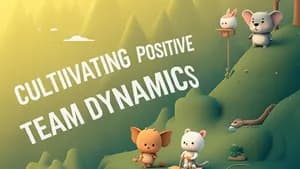Introduction: The Power of Collaborative Learning
Learning isn't always a solitary journey. In many aspects of education, from group projects to collaborative study sessions, teamwork plays a crucial role. Setting shared goals and actively tracking your progress as a team significantly enhances not only the quality of your work but also your overall learning experience. This article explores how proactive goal-setting and regular progress reviews contribute to a positive team dynamic by fostering shared purpose and accountability. You'll discover practical strategies to effectively set team goals, monitor progress, and resolve conflicts—all essential for boosting collaboration and achieving outstanding results.
Defining SMART Team Goals: Clarity and Specificity
When setting goals as a team, it's vital to move beyond vague aspirations and create SMART goals. SMART stands for Specific, Measurable, Achievable, Relevant, and Time-bound. Let's break down each element:
- Specific: Your goals should be crystal clear, leaving no room for misinterpretation. Instead of saying "improve our project," specify what aspects need improvement, such as "increase the accuracy of our data analysis by 15%."
- Measurable: How will you know if you've achieved your goal? Include quantifiable metrics. For example, instead of "get a better grade," aim for "achieve a grade of at least a B+ on the upcoming history exam."
- Achievable: Set ambitious yet realistic goals. Assess your team's skills, resources, and available time. An overly ambitious goal can lead to discouragement, while an easily achievable one may lack motivation.
- Relevant: Ensure your goals directly relate to your overall objectives. If your team's goal is to improve your science project, then each sub-goal should contribute to that overall aim.
- Time-bound: Set deadlines for each step and for the overall project. Deadlines create a sense of urgency and help maintain focus. For example, instead of saying "finish the project soon," specify a date like, "complete the project draft by Friday."
Consider this example: A team working on a science fair project might set a SMART goal like, "Complete a functional prototype of our robotic arm, demonstrating a lift capacity of at least 500 grams, by the end of week three."
Effective Communication and Collaboration Techniques
Open and consistent communication is the cornerstone of successful teamwork. Regular team meetings, where you discuss progress, address challenges, and re-evaluate strategies, are crucial. Establish clear communication channels, whether it's a shared online document, a group chat, or scheduled video calls.
I remember once observing a student group struggle immensely on a project due to lack of clear communication. Each individual had their own understanding of what was needed, leading to duplicated efforts and ultimately, a subpar final product. This highlights the necessity of clearly defined roles, responsibilities, and a schedule for completing tasks.
Establish a system for task delegation based on individual strengths and interests. Regular check-ins help ensure everyone is on track and allows for early detection and resolution of any challenges. Actively encourage feedback—constructive criticism is vital to improvement. Create a team culture of mutual support and respect, promoting open discussions and collaboration.
Monitoring Progress and Making Adjustments
Regular progress reviews are vital. Schedule these reviews at predetermined intervals to assess how well your team is progressing towards its goals. Use visual aids like charts or spreadsheets to track your progress, making it easier to identify areas where you're excelling and where you need to improve.
Don't be afraid to adjust your goals or strategies if needed. Circumstances change, and your initial plan may not always remain optimal. Regularly reviewing your progress allows for flexibility, enabling you to make necessary modifications to remain on track or to adapt to unforeseen challenges.
Think of progress monitoring like navigation. You might plan a road trip with a detailed itinerary, but unforeseen road closures or traffic jams might necessitate adjusting your route. Similarly, in your team projects, if a specific task is taking longer than expected, discuss the issue openly and reallocate resources or adjust deadlines.
Celebrating Successes and Addressing Challenges
As a team, you should celebrate milestones and accomplishments. Acknowledge the efforts of each team member and appreciate their contributions. Celebrating successes boosts morale and reinforces positive behavior. This recognition doesn't have to be grand—a simple 'well done' or a quick acknowledgement during a meeting can make a difference.
Naturally, you'll also encounter challenges. Addressing difficulties promptly and effectively is crucial. When problems arise, foster an environment of open communication and collaborative problem-solving. Avoid assigning blame; focus instead on identifying the root cause and devising a solution together. In my experience, students who learn to approach challenges as opportunities for growth develop valuable resilience and problem-solving skills.
Remember a time when you faced a setback in a team project. Did you learn from that experience? Turning challenges into learning opportunities fosters resilience and makes you a more effective team member in the future.
Conclusion: Teamwork Makes the Dream Work
Proactive goal-setting, consistent communication, and regular progress monitoring are fundamental components of successful teamwork. By implementing these strategies, you'll not only improve your project outcomes, but also cultivate valuable teamwork skills that will serve you well throughout your academic journey and beyond. Remember, the power of collaboration lies not only in achieving shared goals but also in fostering a positive and supportive learning environment where everyone feels valued and empowered to contribute.

